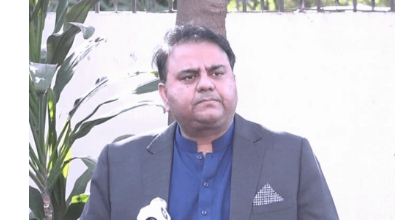ISLAMABAD, DEC 21: PTI leader Fawad Chaudhry on Wednesday warned Punjab Governor Balighur Rehman to “refrain from any adventures” as he asserted that Punjab Chief Minister Chaudhry Pervez Elahi would not be seeking a vote of confidence from the provincial assembly today.
Fawad’s statement came ahead of the expiration of the deadline set by Punjab Governor Balighur Rehman, i.e. 4pm today, for the chief minister to obtain a vote of confidence from the provincial assembly.
On Tuesday, Punjab Assembly Speaker Sibtain Khan had termed the governor’s orders as “illegal, against the provisions of the Constitution and thus stand disposed of”.
In his two-page ruling, the speaker maintained that the governor’s orders were not in accordance with Article 54(3) and Article 127. “The house is in session since Oct 23, 2022, and under Article 54(3) and 127. No fresh session can be convened unless and until the current one ends,” the order read.
Speaking to the media in Islamabad today, Fawad asserted that the vote of confidence would not be held today, saying that the speaker had also issued a ruling in this regard.
Later, in a tweet, the PTI leader said that Elahi had the “complete support” of 187 members of the provincial assembly.
“Ten lawmakers of PML-Q have also expressed confidence in the chief minister. Tomorrow, 177 PTI MPAs will gather in favour of Elahi,” he stated, adding that the political crisis in Punjab was a reflection of the need for snap polls.
On the other hand, Interior Minister Rana Sanaullah said that the PTI could not “resist” the Constitution.
In a tweet, he said the rules stated that the chief minister would cease to hold office if he did not seek a vote of confidence from the provincial assembly. He further said that it was up to the governor to decide when to order the chief minister to seek a vote of confidence.
“We know that they don’t have the numbers required. If they do [have the requisite numbers], then go for the vote of confidence,” the interior minister said.
Earlier, in an interview wit, Sanaullah said that the Constitution gave the governor the authority to ask the chief minister to hold a vote of no confidence “anytime” he wanted to.
Citing Clause 7 of Article 130, the minister said that the governor had the right to ask so as the chief minister “holds the office with the pleasure of the governor”.
He added that Elahi will cease to be the chief minister if he does not abide by the governor’s directives “with effect from the time” of summoning the assembly meeting.
Meanwhile, the PML-N has shared a video of Rehman talking to PPP Punjab Parliamentary Leader Syed Hassan Murtaza regarding the current political situation.
“The decision to not compromise on the Constitution in any way was made during the meeting.”
Govt makes moves against Elahi
After days of hectic politicking, the Pakistan Democratic Movement (PDM) alliance on Monday sprang its own trap to limit the options available to Elahi ahead of the Imran Khan-announced dissolution of the provincial assembly, which is supposed to happen this Friday.
In a double-edged move, the Punjab governor asked the chief minister to obtain a vote of confidence from the Punjab Assembly, while PML-N and PPP lawmakers submitted a separate no-trust resolution against him in a bid to bar him from dissolving the assembly.
The move followed a meeting of party leaders from the PDM coalition, chaired by Prime Minister Shehbaz Sharif.
Under the law, the chief minister cannot dissolve the assembly if a no-confidence motion has been moved against him, while the governor’s requirement for the CM to seek a vote of confidence from the house means he has to ensure that he manages to secure 186 votes.
The PTI has 177 while the PML-Q has 10 members in the Punjab Assembly. On the other hand, the opposition boasts a combined 176 members from the PML-N, PPP and Rah-i-Haq parties.
Legal experts, however, believe if the chief minister fails to win vote of confidence in the timeframe set by Governor Balighur Rehman, the office of Chief Minister would fall vacant — plunging the province into a deep constitutional crisis.
They said this would also expose the practitioner to legal consequences over the purported obstruction. “Those facilitating such constitutional misadventure can be proceeded against as such,” cautioned Advocate Usama Khawar. It would exactly be the same position when during the no-confidence motion against then-prime minister Imran Khan in April [this year], the court later held few individuals guilty of violating the Constitution. “They were not proceeded against, but it cannot be held as precedent or guarantee that it would not happen next time,” he warned.
“Otherwise a figurehead of the province, especially after the 18th Amendment, Article 130 and its sub-clause 7 give discretionary powers to the governor – and do so for a reason. Like the president at the centre, it is the governor who initiates and sets the course of vote of confidence in the province. The chief minister holds office at his pleasure. This is constitution, not interpretation of it,” Mr Usama maintained.
Advocate Supreme Court Malik Awais Khalid agreed. “Article 130 and its sub-clause 7 that deal with the subject clearly state that the governor in his own satisfaction (read discretion) decides when, in his opinion, the chief minister requires a fresh mandate from the house.”
“This is an independent provision, which does not require contingent conditions…The only requirement is that he would fix the time for the chief minister to go through the process and that procedure is also final. If it is not completed within the fixed timeframe, the chief minister is considered to have lost the confidence of the house and his seat,” Mr Malik asserted.
Meanwhile, the experts were also clear about the consequences. “If the vote of confidence process is not completed by today afternoon, the incumbent chief minister would not only lose his office, but he cannot continue even as caretaker — a normal practice of keeping the seat warm till the next one is appointed,” they added.












